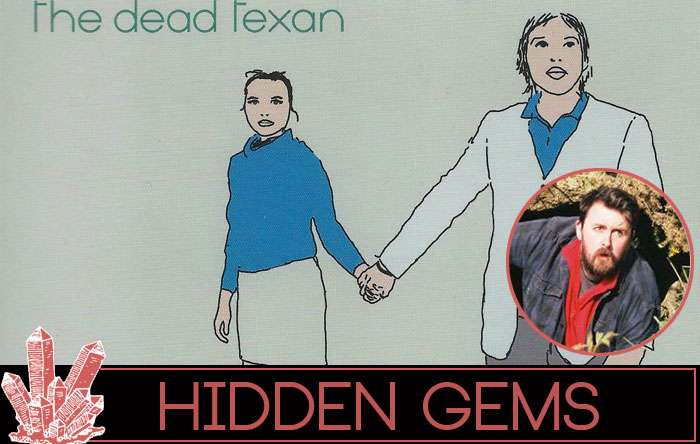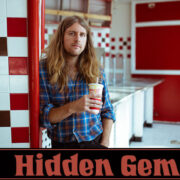Red River Dialect’s David Morris on The Dead Texan – S/T 

Red River Dialect’s fourth album pushed songwriter David Morris’ vision to larger vistas. The album is rooted in touches of his native Cornish folk, but also encompasses the sweeping embrace of tender, yet tangled pop touchstones like Talk Talk, Shearwater or Okkervil River. His songs are personal wrangles with sadness and longing and faith in the face of the world. As such I’d have imagined David to reflect on something similar, an English folk nugget buried in the past or a bit of ’80s pop that perhaps showed similar attention to emotional depth. But, as always, I’ve learned that going into these pieces with expectations always leads down a broken path. Morris mentioned that he was on the verge of picking just such an artist, as he has had a recent interest in Scottish folk musician Jackie Leven, but couldn’t narrow his rabbit hole down to one record. Instead he’s gone in the opposite direction, picking the 2004 eponymous record by The Dead Texan.
Morris expounds on how this record wound up in his orbit, “The record I have chosen is the self-titled and, I believe, only album by The Dead Texan, a duo comprised of Adam Wiltzie (of Stars of the Lid) and Christina Vantzou (who has released some great ambient records under her own name). For the first time in I don’t know how many years, I have just ordered a CD, realising that I don’t own a copy of this and it only came out in a CD/DVD package. I have no idea what is on the DVD. This has been a costly promotional exercise! It came into my life about three years ago, when I began writing a dissertation for my undergraduate degree. I had long been a fan of the Kranky label, from the more ambient end of their roster, including Pan American and Labradford, to great songwriters like Low and Tara Jane O’Neil (A Ways Away by TJO is another record I could have chosen here) and more experimental bands like Nudge. But I had missed this record, I think the album sleeve is not one that I would naturally gravitate towards. This is long lead-in to explaining that it came into my life via YouTube algorithms, arriving through my headphones whilst I typed and typed in my University library, probably drifting in on the vapour coat trails of a Stars of the Lid record. I was so deep into the flow of writing that I didn’t notice what was playing until the magnificent closer, ‘The Struggle’, which introduces a sudden wakeful immediacy and then fades out. At which point I had an experience of ‘wait, what was that, hold on, I just went somewhere new for a while’. I have subsequently listened to it a good thirty or forty times, particularly when writing, which for me is a lot. I would alternate between this and A Winged Victory for the Sullen’s first album and various Popol Vuh records. It’s a good thing I was a humanities student and not doing something objective.”

As for why this record was so lost in its own time, and what makes it a true gem, Morris continues, “To me this album is a seamless and yet hugely varied journey, opening with a rather Stars of the Lid like landscape, but swiftly becoming animate and intricate; the same sense of spaciousness, but with more precise forms arising. There’s a sense of birthing to me. Words like billow, diaphanous, all kinds of cloud-speak are coming to mind, but it’s the way that close sounds and textures of guitars and keys and voices inhabit the space that make it world-like for me. I feel somewhat conscious of tying these reflections to Wiltzie’s work in Stars of the Lid, but it was almost like this record was a depiction of my heart and imagination wandering around in a Stars record. A recording of my own interaction with those spaces, an image of that deep immersion and dialogue, the small tender thoughts and the sadnesses that are allowed to swim out in their majestic openness. There is also a vocal sample, presumably from film dialogue. I remember reading Geoff Dyer’s book Zona, and finding out for the first time where the sample on Stars of the Lid’s “Requiem for Dying Mothers, Part 2” came from.”
On whether this has seeped into his own writing, David contends, “I don’t think this record has influenced my music directly, and the phrase ‘enjoyed on its own delightful merits’ can’t be improved upon!” Always a fan of Kranky myself, I can sympathize with Morris’ intention to skip based on the cover. I too pushed this aside several time, always somehow lumping it in with Hefner releases based on that cover art – a cardinal sin of omission based on aethetics, I know. But if you’re a fan of Stars of the Lid, or for that matter, any of those earlier Kranky records, then this is a worthwhile trip. As for RRD themselves, their latest on Paradise of Bachelors is a record that needs to be lived with for a while, opening itself up with repeat listens and finding a home in the fog of a Sunday morning. It’s a recommended pickup for sure.
Support the artist. Buy it HERE.









